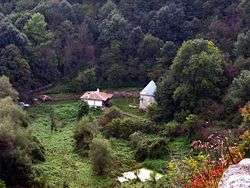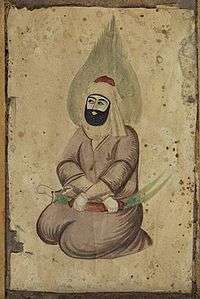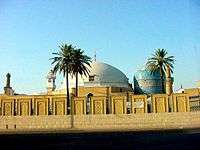Alians

| |||
|---|---|---|---|
| The Fourteen Infallibles | |||
|
|||
| Principles | |||
| Other beliefs | |||
| Practices | |||
| Holy cities | |||
| Groups | |||
|
|
|||
| Scholarship | |||
| Hadith collections | |||
| Related topics | |||
| Related portals | |||
|
|||
The Alians in Turkish Alyanlar, are a Shi`a order, similar to the Sufi Mevlevi, who live in several regions of Bulgaria. Alians revere Ali ibn Abi Talib, son-in-law and first cousin of the Islamic prophet Muhammad, whom they consider an emanation of God. They follow the mystical rituals of the wandering dervishes.
Historical facts
Their exact origin is not certain, since there are few historical records preserved from that time, but according to the prevailing theory they settled in Bulgaria after the 1512 victory by the Ottoman Sultan Selim I, a Sunni, over the first Turcoman Safavid shah of the Persians, Ismail I. It is believed that Alians are descendants of a Sufi-dervish group of priests, who came to the Balkans during the 15th century, in order to keep up the morale of Ottoman soldiers and to help integrate the newly conquered peoples into the empire. The Alians are similar but not the same as Alevi. Because the Alians believed to be descendant's of Imam Ali's son Abbas ibn Ali and Umm ul-Banin.
Other Muslims view Alians as ghulat, because of their views about imam Ali. They are an extremely closed society and zealously hide their rituals. Circumcision is done when the Boy is one week old, and with 13 year's he got the first time shaved his Pubic Hair in a special ceremony, who only Male Elders are there. They married closed in the Tribe and in a young age. It is known that Alians are mysticists and believe in personal communication with God through a near-trance state. They do not use the traditional Islamic rituals, but use candles and wine.
In Bulgaria, Alians inhabit predominantly the villages of Yablanovo and Malko Selo in Sliven Province; Sevar, Ostrovo, Madrevo, Sveshtari, Bisertsi, and Lavino in Razgrad Province; Preslavci, Chernik, and Bradvari in Silistra Province; and Mogilets and Bayachevo in Targovishte Province.
Demir Baba teke is a sacred place to Alians and other Islamic sects because Demir Baba, a famous dervish who lived during the 16th century, is buried there in the lands of northeastern Bulgaria. The tekke of Otman Baba, located in the Haskovo-region village of Teketo, is another Alian holy site.[1]
Alians refused to visit madrassahs in the Ottoman Empire, because orthodox Sunni Islam was taught there. As a consequence, they educated their children only within the bounds of their society, and that led them to a decline. The latter, along with the reticence of their esoteric culture, and the urbanization, doomed them to gradual assimilation. By the Second World War and the following communism in Bulgaria many Alians fled in the European part of Turkey.
References
- ↑ Bosakov, p. 282.
Notes
- Житието на Демир Баба и създаването на ръкописи от мюсюлманите от хетеродоксните течения на исляма в Североизточна България (in Bulgarian).: Demir Baba's life and the creation of manuscripts by heterodox Muslims in northeastern Bulgaria
- "Демир баба теке е светиня" (in Bulgarian).: Demir baba teke is a holy place
- "Националният институт за паметници на културата иска да спре реставрацията на Демир баба теке" (in Bulgarian).: The National institute of cultural monuments want to halt the restоration of Demir baba teke
- Георгиева, И. (1997). Българските алиани. Сборник етнографски материали. (in Bulgarian). Sofia. Bulgarian Alians. A collection of ethnographic materials.
- Bosakov, Vesselin (1999). "Religious and sociocultural dimensions of the Kazalbashi community in Bulgaria". Facta Universitatis. University of Niš. 2 (6): 277–283.

